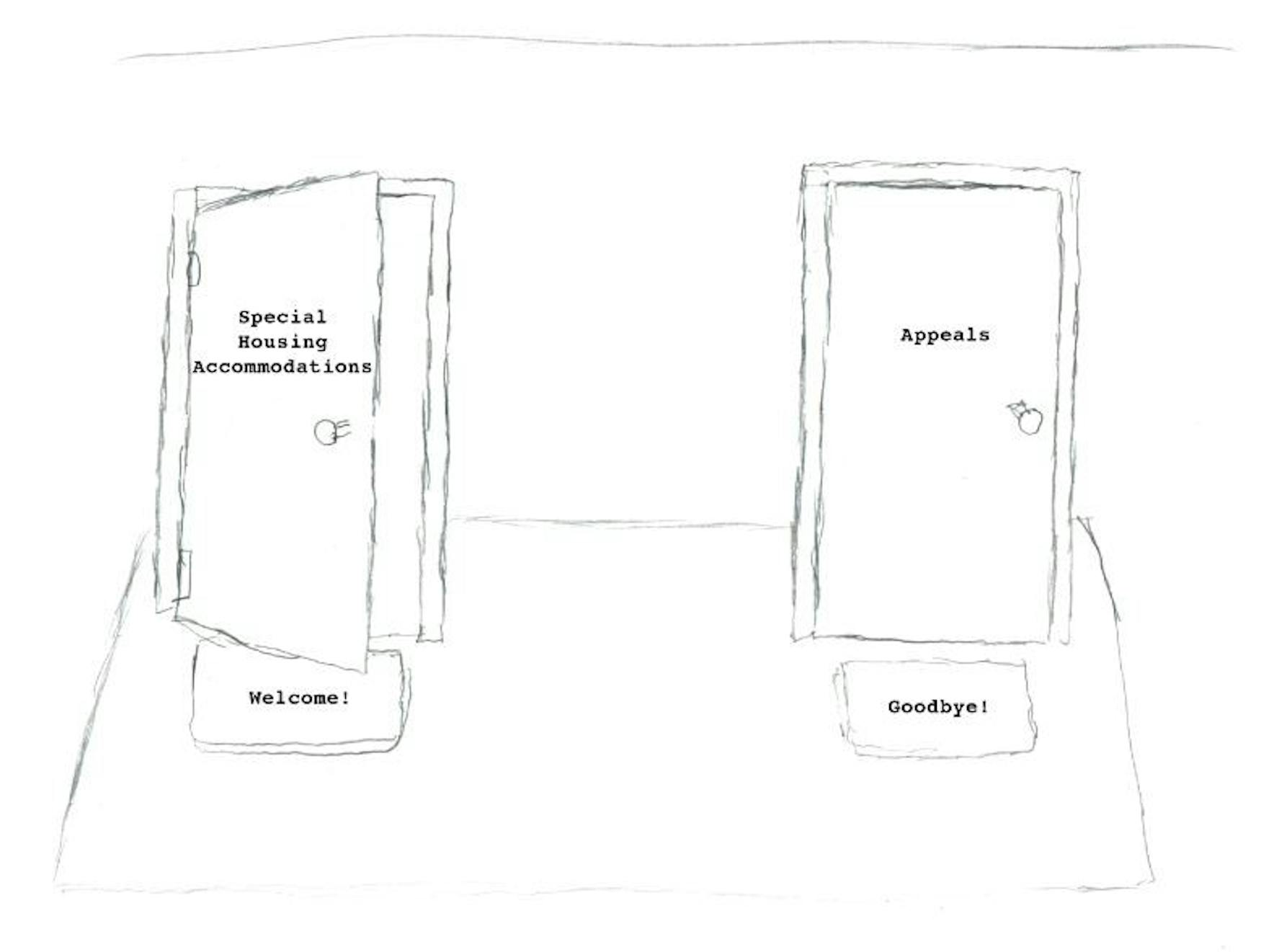EDITORIAL: Call for transparency in housing accommodation process
With housing lottery numbers to be released soon, this board urges the University to re-evaluate this year’s process in order to make it more transparent for students, specifically regarding special housing accommodations.
In order to receive special housing accommodations, students must submit a general form that requires basic information such as class year and telephone number, as well as a medical provider form that includes more detailed information about specific medical and/or psychiatric disabilities. This form must be signed by a student’s physician and must be accompanied by full medical documentation, such as laboratory or test results.
When applying for accommodations, students must specify which room conditions they need, such as air conditioning, carpeting and kitchen access, as well as how those conditions would help them with their daily functioning, per the general form.
The two forms, along with the medical documentation, are then brought to a panel that consists of medical health clinicians, dietitians, disability specialists and a housing operations representative, according to a March 12 email to the Justice from Timothy Touchette, Assistant Dean of Student Affairs. “Special care is given to review every case,” Touchette wrote.
The Housing Accommodation Requests Guide provides a list of criteria that the committee follows when assessing a student’s needs, including room availability, whether the request was made on time, whether the request places an undue financial burden on the University, how it affects other students and whether there are other housing options that would have the same effect.
If an accommodation request is granted, the student may either receive a low housing lottery number or be placed in specific housing, such as a room that is wheelchair accessible. Some rooms, such as those with Americans with Disabilities Act accessibility features, are not available to the general student body during the general housing selection process, according to Touchette. These, along with other spaces that “feature modifications based on the need,” are reserved for the housing accommodations process.
Representatives from the Justice and The Brandeis Hoot attended an informational meeting organized by Student Union President Jacob Edelman ’18 to see what the housing lottery process looks like. Generally, numbers 1-49 are reserved for medical accommodations for sophomores, and 1501-1549 for upperclassmen. These numbers are scaled to accommodate the approved requests, according to Touchette. Since the University does not guarantee housing for upperclassmen, if students’ medical records report a need for campus housing, “they may be prioritized,” according to the Accommodations Request Guide.
Students must submit requests every year, and there is no guarantee that the request will be approved each time. It is possible for a student to receive accommodations one year but not the next, and vice versa. This year, students were notified of their requests in the beginning of March, two weeks before the release of housing lottery numbers.
This board recognizes the complex process that the Department of Community Living adheres to, as it requires the time and effort of many involved. However, DCL could be more transparent with the process and allow for ample time to appeal the decision before housing numbers come out.
The Justice interviewed a sophomore whose application for special accommodations for the upcoming academic year was rejected. We granted this student anonymity due to the sensitive nature of her situation. Suffering from chronic fatigue and an allergy to peanuts, she is worried about her future housing arrangements. “If I maybe put my food down on the same table where they [my suitemates] had a peanut butter sandwich and then eat my food, I could end up in the hospital,” she told the Justice. This year, she lives in a double and was able to choose her own roommate, but she is concerned she will be placed with other students who would not necessarily be as accommodating.
When she first inquired about disability housing, DCL encouraged her to apply, and they were all “really nice and really, really supportive about whether I needed housing,” which is why she is surprised that her recent request was not granted. She followed up with an email asking why but has not yet received a response as of press time, two days before the release of housing lottery numbers.
In a March 11 email to the Justice, Cynthia Crispino ’21 explained that she had “really bad environmental allergies” and requested a room with air conditioning and no carpet, but her application was rejected.
Lily Fisher Gomberg ’20 explained that she applied for a single for the upcoming academic year because of Generalized Anxiety Disorder and Attention Deficit Disorder, but her application was rejected as well, per a March 12 email to the Justice. She reached out to DCL minutes after receiving the notification but did not receive an answer until four days later, telling her she would receive a reason for the denial the upcoming Monday, March 12. However, Gomberg said, this did not occur.
According to Gomberg, when she went to the DCL office that same Monday, the coordinator was out of the office and no one in the office at that time could give her any information. Housing numbers are released March 14, and the lack of communication means Gomberg has “no opportunity to go through the appeals process” before then.
While the special housing accommodations process is long and handled with sensitivity by the committee in charge, this board urges DCL to make the appeals process easier and to allow for more transparency in the rejection process. Students who have allergies or special needs may face unnecessary stress when dealing with the housing process, and a fair and more transparent appeals process would be a step in the right direction.




Please note All comments are eligible for publication in The Justice.